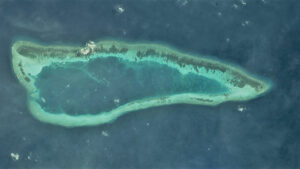THE PHILIPPINES must still protect disputed waters off its western coast to preserve biodiversity and ensure the sustainability of its fisheries, marine scientists said.
“The Philippines lacks policies to support marine scientific research,” Deo Florence L. Onda, deputy director for research in the University of the Philippines Marine Science Institute (MSI) said.
Mr. Onda said the MSI is also pushing for the establishment of a department of fisheries and oceans as 82% of Philippine territory consists of water.
“It deserves an entire agency that will take care of the resources that we have in the blue waters of the country,” he said.
Mr. Onda said the West Philippine Sea suffers from overfishing and destructive fishing.
The intrusion of other countries has also contributed to the decline in the health of the environment there from poaching and illegal fish harvests.
Mr. Onda said many areas in the West Philippine Sea remain productive, such as Ayungin Shoal.
“Ayungin Shoal has been a hotspot for geopolitical tensions… but our studies show how productive Ayungin Shoal is,” he said.
Meanwhile, Ma. Carmen Ablan-Lagman, a Biology professor at De La Salle University, said the Kalayaan island group produces about 17 metric tons (MT) of fish per square kilometer (km²) per year.
The fishermen who ply these waters, based in Masinloc, Zambales, are estimated to have been denied access to 13 MT of fish per km² annually due to China-imposed fishing restrictions.
“The resources in that area are worthy of protection mainly not just because of the uniqueness of the things in there but the potential of the place,” she said.
According to Drusila Esther E. Bayate, undersecretary for fisheries at the Department of Agriculture, the West Philippine Sea accounts for about 15% of capture fisheries production.
There were 375,190 registered fisherfolk that depend on the West Philippine Sea, as of January.
She said that among the threats to the livelihood of the fishing community are climate change, extreme weather events, harassment from domestic and foreign poachers, and destructive fishing.
National Security Council Assistant Director Jonathan E. Malaya said that the government is undertaking a reassessment of maritime governance to deal with security challenges.
He also said National Security Adviser Eduardo M. Año is currently in the process of “developing a clear and coherent national strategy” for the West Philippine Sea.
“On the international level, we must harness the strengths of our partners, our strategic like-minded partners in the region to our advantage for further capacity-building measures,” he said.
This includes joint military exercises as well “cooperation that will bring the country closer to becoming a capable maritime nation.” — Sheldeen Joy Talavera
